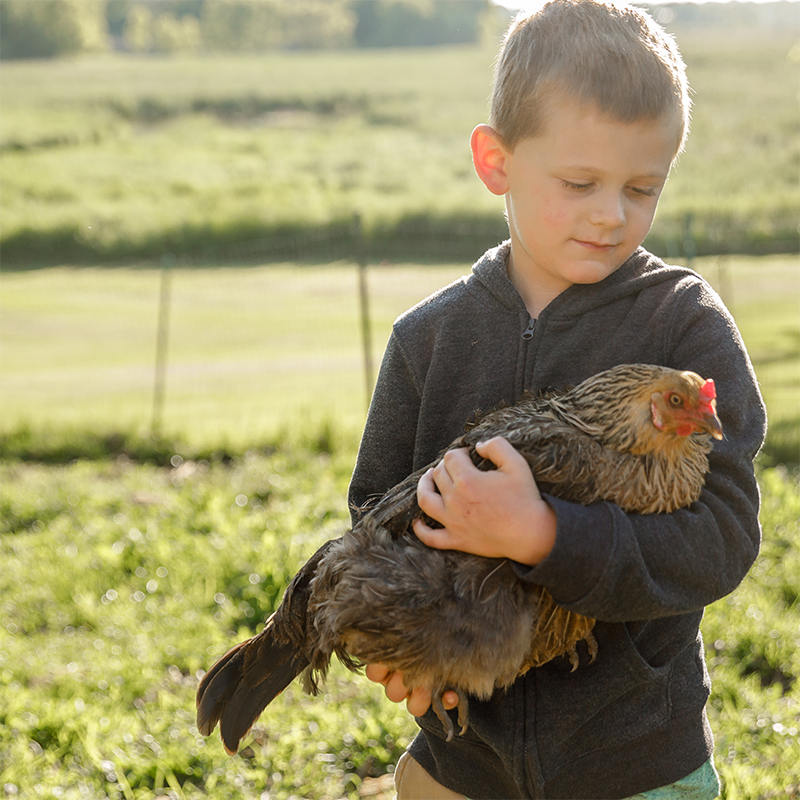Backyard Chickens Launch Careers

Many parents build a backyard coop and stock it with a few hens as an interesting way to help their children learn responsibility by caring for animals and where food really comes from.
These are important lessons, but chickens offer children much more. A small flock can spark curiosity and imagination that gels into a rewarding career or lifelong hobby.
That may sound far-fetched but ask successful people what sparked their interest and led toward a career or meaningful hobbies and often they’ll say: “When I was only four or five years old Dad and I made a birdhouse and ever since I’ve been fascinated with building things…so I became an engineer.” Or, “When I was only a few years old I spotted a brilliant red bird out our kitchen window. Mom and I looked in her bird book and identified a Scarlet Tanager. Birding’s been my passion ever since.”
Parents never know what might ignite a child’s interest, so even brief exposure to a diversity of positive experiences can spark a lifelong passion. Master teachers recognize that curiosity is a powerful precursor to learning. Rather than doling out facts, gifted teachers create an environment that stimulates curiosity. Students eagerly take it from there.
Jane Goodall, famous for observing and documenting chimpanzee behavior in Africa, began her naturalist career as a young child carefully watching how chickens lay eggs in her grandmother’s chicken coop.
Chickens are fascinating creatures, and a small flock can begin a child’s adventure in science. A few hen’s ability to teach out values the eggs they might contribute to the family. Children who joyfully interact with their chickens are poised for a satisfying career in animal care and agriculture.
According to Dr. Susan Lamont, Distinguished Professor of Agriculture at Iowa State University, many career opportunities are open in poultry and other areas of agriculture. More will be available when today’s youth hit the job market in 10 – 15 years. “Even children growing up in urban or suburban neighborhoods can find a rewarding career in agriculture. Lessons learned caring for a chicken flock can nudge a youngster in that direction,” Lamont says.
“There are many careers of various types open for students at all levels of education. Some have PhD degrees but others work as research associates or lab technicians with lesser degrees. Some openings require a high school diploma and further technical training in robotics, electronics, and other areas if they are doing maintenance or facility services on larger farms. Some farms hire engineering graduates. It depends on the situation. Then there are jobs in food safety that may require a certification. There certainly are jobs open in poultry and salaries are competitive,” says Lesa Vold, Communications Specialist at the Egg Industry Center.
Do some experimenting
Parents can help pique kids’ curiosity by encouraging simple chicken experiments. These help kids learn the scientific method while letting the hens be teachers. Here are a few simple examples:
Do chickens prefer sleeping with certain flock mates?
It helps to have five or six hens that are easy to identify as individuals. Perhaps they have different feather colors, patterns or physiques. Each evening take the child to the coop and photograph roosting birds. This is data collection. After taking photos for a week analyze them. Is there a pattern? Does the Rhode Island Red always or usually sleep next to the Black Australorp? This is data analysis. If a clear pattern emerges then the child has learned that hens like sleeping by a certain flock mate…or not. This is drawing conclusions based on observation and analysis.
Do chickens have food preferences?
Put a cup or two of chicken scratch or wild bird seed mix in a bowl. Take a picture of the contents. Let the chickens access it. They’ll usually crowd right in and start pecking. Observe carefully. Do hens prefer certain seeds over others? If yes, which ones? Do they shun some seeds? What does this mean? Can chickens distinguish one type of seed from another? How do they do this?
These are basic and simple experiments that can be done with very young children. They sharpen observation skill, spark curiosity, and introduce kids to the scientific method used by researchers in dozens of areas to advance human knowledge.
A fulfilling career just might be hatched in the backyard coop.
